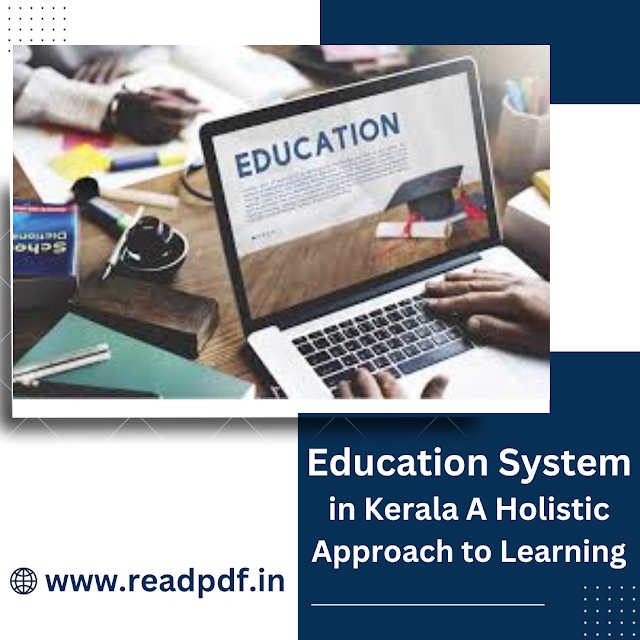Education is the cornerstone of a progressive society, and Kerala, a southern state in India, has set an exemplary standard when it comes to its education system. Known for its high literacy rates and quality educational institutions, Kerala's approach to education focuses on inclusivity, innovation, and holistic development. In this article, we will explore the key aspects of the education system in Kerala and delve into the factors that contribute to its success.
A Brief Overview of Kerala
Kerala, often referred to as "God's Own Country," is a state in India's southwestern region. Renowned for its natural beauty, cultural heritage, and social progress, Kerala has achieved remarkable milestones in the field of education. With a literacy rate of over 96%, the state stands as a shining example of how a well-designed education system can empower individuals and uplift society as a whole.
Early Childhood Education
In Kerala, early childhood education is given significant importance to lay a strong foundation for lifelong learning. Pre-primary schools and Anganwadi provide a nurturing environment for children aged 3 to 6 years. The focus is on developing cognitive, social, and emotional skills through play-based learning methodologies. Trained educators employ innovative techniques to enhance children's creativity, critical thinking, and problem-solving abilities during these crucial formative years.
Primary and Secondary Education
Kerala follows a comprehensive and inclusive approach to primary and secondary education. The state government ensures free and compulsory education for children aged 6 to 14 years through a network of government and private schools. Emphasis is placed on providing quality education, equitable opportunities, and reducing the dropout rate. The curriculum covers various subjects, including languages, mathematics, sciences, social sciences, arts, and physical education.
Vocational Training and Skill Development
To address the diverse needs of students and promote employability, Kerala's education system integrates vocational training and skill development programs. Vocational schools offer specialized courses in areas such as agriculture, engineering, healthcare, hospitality, and information technology. This approach enables students to acquire practical skills alongside academic knowledge, preparing them for a successful transition into the workforce.
Higher Education in Kerala
Kerala boasts a robust higher education sector with numerous universities, colleges, and research institutions. The state's universities offer a wide array of undergraduate, postgraduate, and doctoral programs across various disciplines. The focus is on promoting research, innovation, and entrepreneurship. Kerala's colleges are known for their academic excellence, and students from different parts of the country flock to the state to pursue higher education.
Teacher Training and Professional Development
Recognizing the pivotal role of teachers in shaping young minds, Kerala emphasizes teacher training and professional development. Specialized institutes offer pre-service and in-service training programs to enhance pedagogical skills, subject expertise, and teaching methodologies. Continuous professional development initiatives keep teachers updated with the latest advancements in education, ensuring a high standard of teaching and learning.
Inclusive Education Practices
Kerala's education system firmly believes in inclusivity and caters to the diverse learning needs of students. Special education programs and resource centers provide support to students with disabilities and learning difficulties. Additionally, steps are taken to ensure gender equality and promote education for marginalized communities. This inclusive approach fosters an environment where every child has an equal opportunity to thrive.
Technological Integration in Education
Kerala has embraced technology as a catalyst for educational advancement. The state has implemented the ambitious 'Hi-Tech School' project, which equips classrooms with digital infrastructure, interactive whiteboards, and multimedia learning resources. E-learning platforms, online educational content, and virtual classrooms have become integral parts of the education system, enhancing engagement and expanding access to quality education.
Curriculum and Pedagogical Innovations
To keep pace with the evolving needs of the 21st-century learner, Kerala's education system promotes curriculum and pedagogical innovations. Project-based learning, experiential learning, and interdisciplinary approaches are encouraged to develop critical thinking, problem-solving, and communication skills among students. The curriculum also incorporates environmental education, cultural heritage, and values-based education to nurture responsible citizens.
Assessment and Evaluation Methods
Kerala follows a comprehensive and continuous assessment system that evaluates students' progress holistically. Alongside traditional exams, formative assessments, portfolios, projects, and presentations are used to assess students' understanding, application, and creativity. This approach encourages active participation, reduces exam-related stress, and provides a more comprehensive view of students' abilities.
Parental and Community Involvement
The education system in Kerala recognizes the vital role played by parents and the community in a child's education. Regular parent-teacher interactions, parent education programs, and community outreach initiatives are organized to foster a collaborative learning environment. Parental involvement enhances student motivation, academic performance, and overall well-being.
Challenges and Future Prospects
While Kerala's education system has achieved significant milestones, it also faces certain challenges. The increasing demand for quality education, ensuring equitable access across all regions, and addressing the digital divide requires attention. Additionally, aligning the curriculum with industry needs and fostering entrepreneurship skills will further enhance Kerala's education system.
Conclusion
The education system in Kerala exemplifies a holistic approach to learning, emphasizing inclusivity, innovation, and community participation. By prioritizing early childhood education, comprehensive schooling, vocational training, and higher education, Kerala has created a nurturing ecosystem that empowers its citizens to excel academically, professionally, and socially. With its continued commitment to educational excellence, Kerala is paving the way for a brighter and more prosperous future.
Education System in Kerala FAQs
What is the literacy rate in Kerala?
Kerala boasts a literacy rate of over 96%, making it one of the most literate states in India.
How does Kerala promote inclusive education?
Kerala promotes inclusive education by providing support to students with disabilities, ensuring gender equality, and reaching out to marginalized communities.
What are the key features of Kerala's Hi-Tech School project?
The Hi-Tech School project equips classrooms with digital infrastructure, interactive whiteboards, and multimedia learning resources to enhance the learning experience.
Does Kerala's education system focus on skill development?
Yes, Kerala's education system integrates vocational training and skill development programs to prepare students for the workforce.
What are the future prospects for Kerala's education system?
Kerala aims to address challenges such as equitable access, the digital divide, and industry alignment to further enhance its education system and ensure a brighter future.
Is the education system In Kerala good?
Yes, the education system in Kerala is considered good. The state has achieved high literacy rates and emphasizes quality education. Kerala's focus on human development and investment in schools, colleges, and universities contribute to its reputation for providing an accessible and well-rounded education to its students.
Why is Kerala good In education?
Kerala is known for its excellent education system due to several factors. The state has high literacy rates, strong government initiatives, and a focus on quality education. Kerala's emphasis on primary education, well-trained teachers, and the availability of educational resources contribute to its reputation as a hub of educational excellence.
What is our education system?
Our education system refers to the structured framework of educational institutions, policies, and practices that facilitate the learning and development of individuals. It encompasses schools, colleges, universities, curriculum design, teaching methods, assessments, and regulations. Its primary goal is to impart knowledge, skills, and values to students for their personal and professional growth.
Why is Kerala called the best state in India?
Kerala is often considered the best state in India due to its exceptional human development indices, high literacy rate, progressive social indicators, robust healthcare system, and emphasis on quality education. Its serene backwaters, lush greenery, rich cultural heritage, and harmonious coexistence of diverse communities add to its allure.
Why is Kerala the most educated state?
Kerala is considered the most educated state in India due to its remarkable achievements in literacy and educational indicators. Its high literacy rate can be attributed to strong government initiatives, prioritization of education, widespread access to schools, and a strong culture of learning and intellectual curiosity among its population.


